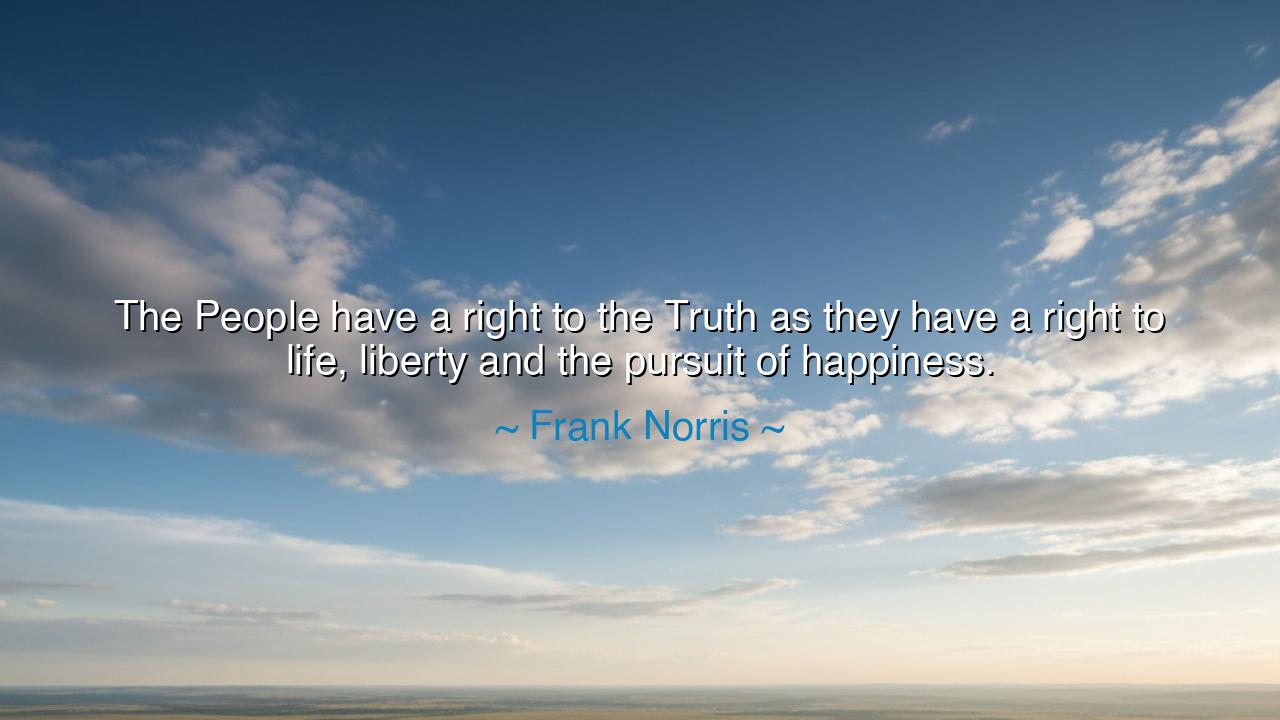
The People have a right to the Truth as they have a right to
The People have a right to the Truth as they have a right to life, liberty and the pursuit of happiness.






In the solemn and stirring words of Frank Norris, a writer who saw through the illusions of his age, we hear a declaration that still trembles with power: “The People have a right to the Truth as they have a right to life, liberty and the pursuit of happiness.” In this one sentence, he places Truth among the most sacred of human rights, alongside those immortal ideals first proclaimed in the founding of nations. For Norris, who lived in an era when corruption and deceit often cloaked themselves in progress, truth was not a luxury—it was the lifeblood of freedom itself. Without it, liberty decays into illusion; happiness becomes hollow.
The origin of this quote comes from the heart of American idealism at the turn of the twentieth century—a time when industry was rising, power was consolidating, and the voices of the people often went unheard. Frank Norris, the novelist of realism and moral struggle, stood among those who believed that literature and journalism must serve not merely art, but justice. To him, truth was not a thing to be hidden in books or guarded by the powerful—it was the right of the common soul, as essential as air or bread. In his time, the press was awakening to its sacred duty: to reveal, to question, to hold the mighty to account. Norris gave that duty a moral foundation, saying that the truth is not a privilege for the few, but the inheritance of all.
Through his words, we can hear the echo of the ancients, who too saw truth as divine. The philosopher Plato taught that truth is the light of the soul—that without it, men stumble in the shadows of falsehood. Likewise, the Roman Cicero declared that truth is the foundation of justice, and justice the guardian of civilization. Frank Norris, in his own age, extended this chain of wisdom into the modern world. He saw that democracy itself, that fragile flame of the people’s voice, cannot survive without truth to illuminate it. To deceive the people is not only a lie—it is an assault upon their very right to live free.
History itself proves the might of this principle. Consider the story of Upton Sinclair, Norris’s contemporary, who wrote The Jungle to expose the horrors of the meatpacking industry. His words shocked the conscience of a nation and awakened reform. Though Sinclair sought to stir compassion, he instead struck the deeper chord of justice: the people demanded truth, and in their demand, the law itself was changed. The Truth, once spoken, became a force mightier than kings or corporations. It cleansed and renewed. This is the power Norris honored—the power that rises when ordinary people see clearly and act bravely.
But there is also warning in his statement. For if truth is a right, then the denial of it is a crime against the spirit of humanity. When those in power manipulate, conceal, or distort, they steal not only knowledge but dignity. The people deceived are like travelers led astray by false stars. Such deceit weakens the bonds of trust that hold civilization together. In every age where falsehood reigns—whether through propaganda, silence, or ignorance—tyranny grows strong. Therefore, Norris’s call is not merely poetic; it is revolutionary. It demands vigilance, courage, and a refusal to bow before comfortable lies.
To live by this wisdom, one must become both seeker and guardian of truth. Each person carries this duty—to question, to learn, to speak honestly, even when honesty wounds. In our time, where voices clash and facts are twisted like reeds in the wind, the task grows ever more sacred. We must remember that truth does not belong to parties or powers—it belongs to the people. It is the inheritance of the free and the weapon of the just. Without it, liberty becomes a word without meaning, and happiness, a dream built on sand.
So let this be the lesson passed from generation to generation: cherish the truth as you cherish your own freedom. Seek it in words, defend it in speech, and live it in deed. Do not be content with comfort when clarity demands courage. For every age must fight anew for the right to know, the right to see, the right to understand. As Frank Norris declared, truth stands beside life, liberty, and happiness as the very foundation of human dignity. Without it, all the rest crumble. With it, even the smallest voice can shake the walls of falsehood and set the world again in light.






AAdministratorAdministrator
Welcome, honored guests. Please leave a comment, we will respond soon